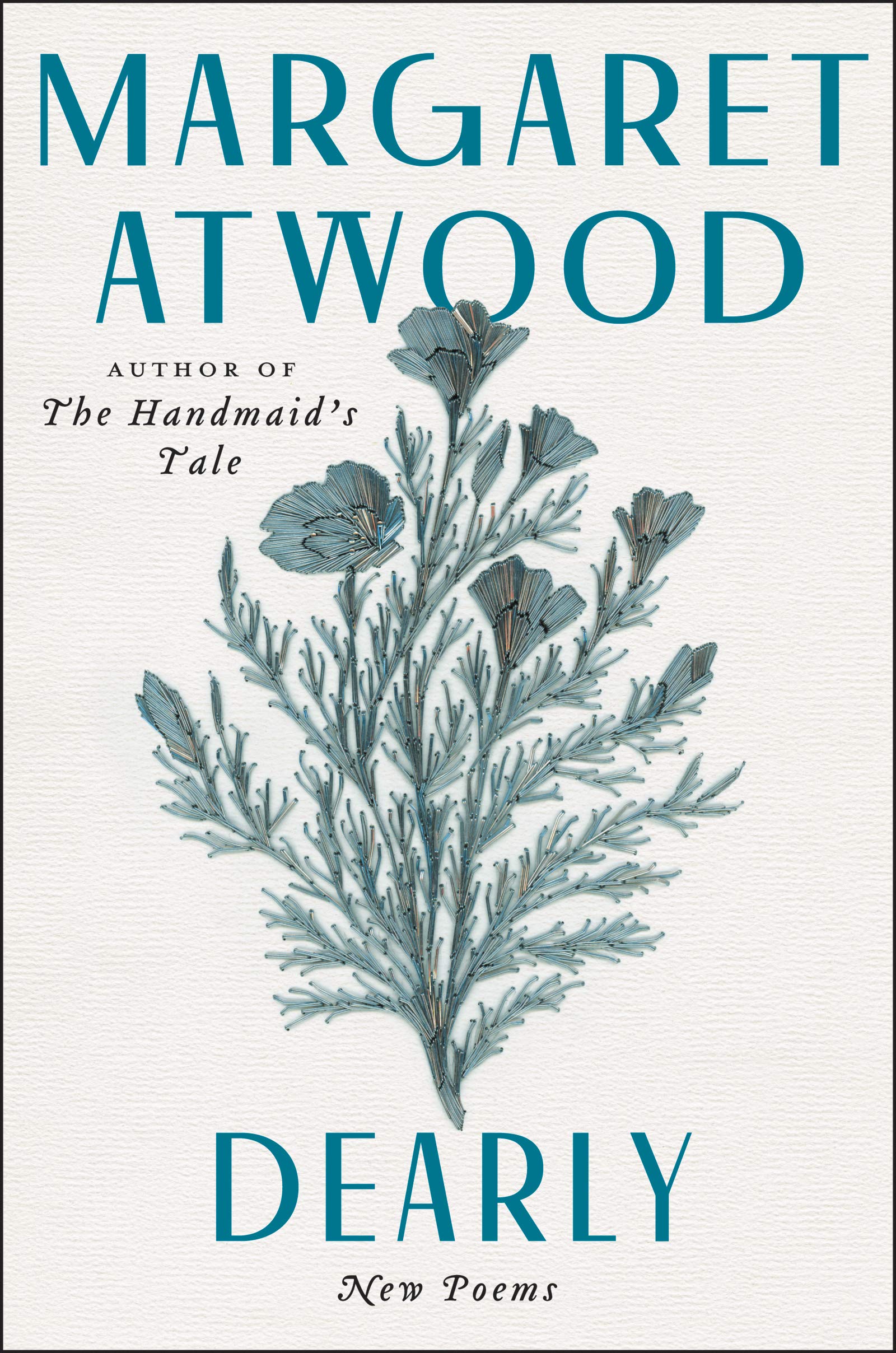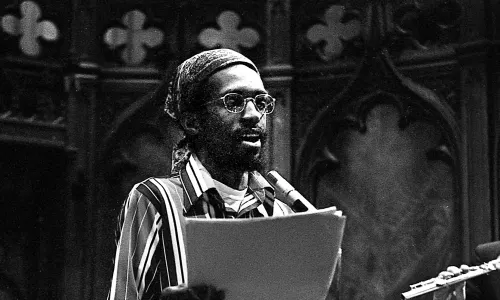Margaret Atwood’s “Dearly”: A Comprehensive Evaluation of Loss, in All Its Forms

Margaret Atwood’s new book is deceptively thin with a bouquet of flowers on the cover that suggests something romantic and lighthearted inside. As the old adage about books and their covers goes, this assumption could not be further from the truth. “Dearly” is a collection of poems that fearlessly explores tragedy and grief and asks its readers to take responsibility for the things in the world that matter to them.
Atwood, the critically acclaimed and award-winning author of “The Handmaid’s Tale” and “Oryx and Crake,” published “Dearly” on Nov. 10, her first book of poetry in over a decade. While some of the poems in the collection have appeared in previous publications, most are new, and offer the comfort of an established literary voice in a refreshingly new format.
The resulting book is a nuanced exploration of what it means to be human in the contemporary world: what we hold dear, what we worry about, what we should worry about and what we should let go of. The complexity of the collection stems from its healthy balance of simple imagery and heavy themes. One such poem, which transitions from a description of mushrooms to commentary on the destructive nature of mankind, exemplifies this balance. Though the contrast between the mundane and the profound can almost seem contradictory, it simply reflects the cognitive dissonance of trying to find goodness and meaning in the midst of a world that seems empty of everything but disaster.
“If there were no emptiness, there would be no life,” Atwood writes.
The collection is divided into five parts, each containing around 10 poems. The sections are untitled, and do not always maintain cohesive themes. There does, however, seem to be a widening of scope and subject matter as the reader moves through the book. Overall, the language is simple and accessible, filled with natural imagery that lends itself to Atwood’s commentary on the environment throughout the collection. Often, the poems will start with a deceptive lightness, but will end on a deeply thoughtful note that leaves us feeling like Atwood has looked into our very soul and left us with exactly what we needed to hear.
In the first two sections, the focus is on interpersonal relationships, and more specifically on memory, vulnerability, and loss. In a particularly poignant poem about her late mother, Atwood ruminates on the inevitable deterioration of the people we love, positing that to love someone is to be vulnerable to grief.
“How tall she used to be, / how we’ve all dwindled,” she writes.
“Songs for Murdered Sisters,” a poem that was written in memory of the murdered sister of singer Joshua Hopkins, dips into the subject matter Atwood is best known for: feminist commentary and speculation. “The Handmaid’s Tale,” for example, imagines a future in which women are completely subjugated by men. In this collection, however, Atwood doesn’t feel the need to speculate on the discrimination and sexual violence of the future; there is more than enough of that in our past and present. This poem is a lament of several parts that spans eight pages, moving through all the stages of grief but spending most of its time on rage.
“So many sisters killed / Over the years, thousands of years / Killed by fearful men / Who wanted to be taller,” the poem reads.
Apart from this poem and one or two others, this book does not present a lot of explicitly gendered commentary. Instead, the collection tends more toward universal experiences. When it does come up, though, it’s nice to be reminded of what made Atwood a household name.
Toward the middle of the book, the implications of Atwood’s subject matter become much more consequential. Instead of describing individual relationships, she meditates on the nature of humanity at large, and the danger we pose to ourselves and the world. She writes about the ethical cost of progress and innovation, how the things we create often only aid in the destruction of ourselves or of our planet. She questions whether we realize what we’re doing, and if so, whether we are willing to stop.
The answer she arrives at is a pessimistic one:
“And the magic machine grinds on and on / spewing out mountains of whatnot / and we throw it all into the sea / as we have always done / and this will not end well.”
Not only does Atwood predict our downfall through climate change, but she unflinchingly asks the harrowing questions that many of us are too afraid to:
“Oh children, will you grow up?”
By making this as a rhetorical question, Atwood is putting herself in the same boat as the reader: none of us knows the solution, but all of our children will pay the price if we are unable to come up with one.
In the final few poems of the book, Atwood markedly shifts from catastrophizing to peacefully accepting her mortality. Given the context of the previous sections, this change feels like a defeat, a resignation to disaster. It doesn’t seem that Atwood is advocating that the rest of us give up, though; she is simply expressing that she has personally come to terms with death. She writes about old age: the deterioration of her mind and body, the disconcerting solitude of her fading recollections of lost loved ones. These poems, in which she talks about her journey through this intensely personal yet universal experience, are the best in the book. Because they are so intimately connected to the author’s experience at the end of her life, they take on a tone of remarkable importance and profundity. It’s as though she plays the role of a grandparent, lovingly offering wisdom and comfort to younger generations who need it desperately.
Although she hits a stride by the end of the book and leaves us with some truly masterful works of poetry that ask readers to reevaluate tragedy and loss, not every poem in the book is so impactful. Especially toward the beginning of the collection, there are some blatantly weird ones (a few about slug sex and werewolves come to mind) and others that aren’t as weird as they are incongruous with the rest of the book. While there are several impactful, stunning poems scattered throughout (though concentrated towards the end), the majority of them are simply meditations on human experiences. These poems are still a joy to read, given Atwood’s mastery as a writer and her knack for saying something meaningful with deceptively simple language, but they are not necessarily working you will think about beyond the moment you let them wash over you.
It felt really good to read a work of literature that tries earnestly to deal with the confusing mess of a world that we live in. The consistency of grief and tragedy in the 21st century is exhausting and detrimental, and yet, for many of us, life continues on, undeterred. How do we reconcile these two things: collective sorrow and the desire for individual joy? This is a paradox Atwood tries to approach within this collection. She neither arrives at a clear answer or solution, nor does she say anything groundbreaking about these circumstances, and yet it is still comforting to experience the journey with her, if only to understand that we are not alone in it.
The final poem of the book, aptly named “Blackberries,” describes the bittersweetness of looking back upon a life full of hardship and love. It beautifully encapsulates the striking yet comforting confrontation with reality that characterizes the entire book.
“That’s good times: one little sweetness / after another, then quickly gone,” she writes.
Ella Tierney can be reached at etierney@wesleyan.edu








Leave a Reply